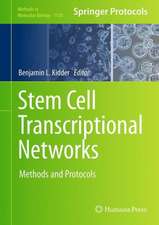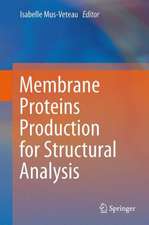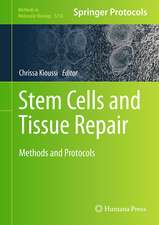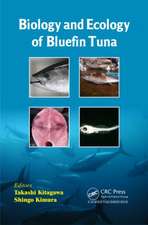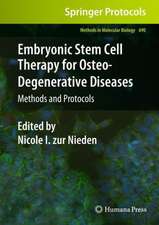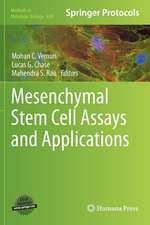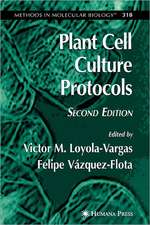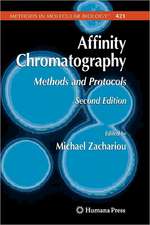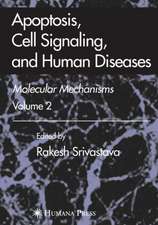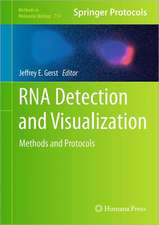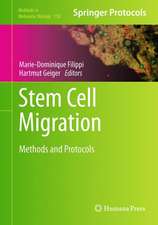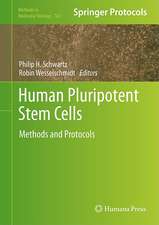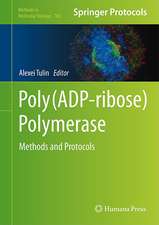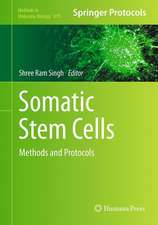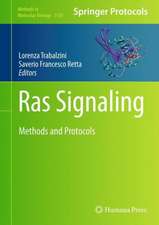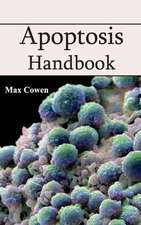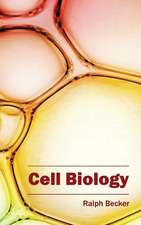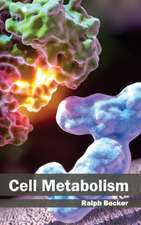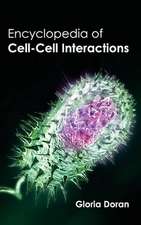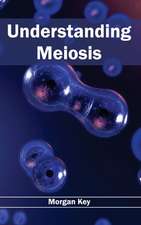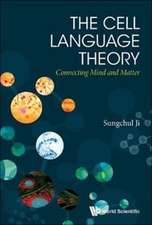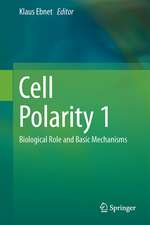Embryonic Stem Cell Immunobiology: Methods and Protocols: Methods in Molecular Biology, cartea 1029
Editat de Nicholas Zavazavaen Limba Engleză Hardback – 12 iun 2013
Authoritative and accessible, Embryonic Stem Cell Immunobiology: Methods and Protocols serves as an ideal guide to experts and non-experts interested in different aspects of stem cells.
| Toate formatele și edițiile | Preț | Express |
|---|---|---|
| Paperback (1) | 774.97 lei 43-57 zile | |
| Humana Press Inc. – 23 aug 2016 | 774.97 lei 43-57 zile | |
| Hardback (1) | 645.79 lei 43-57 zile | |
| Humana Press Inc. – 12 iun 2013 | 645.79 lei 43-57 zile |
Din seria Methods in Molecular Biology
- 9%
 Preț: 791.59 lei
Preț: 791.59 lei - 23%
 Preț: 598.56 lei
Preț: 598.56 lei - 20%
 Preț: 882.95 lei
Preț: 882.95 lei -
 Preț: 252.04 lei
Preț: 252.04 lei - 5%
 Preț: 802.69 lei
Preț: 802.69 lei - 5%
 Preț: 729.61 lei
Preț: 729.61 lei - 5%
 Preț: 731.43 lei
Preț: 731.43 lei - 5%
 Preț: 741.30 lei
Preț: 741.30 lei - 5%
 Preț: 747.16 lei
Preț: 747.16 lei - 15%
 Preț: 663.45 lei
Preț: 663.45 lei - 18%
 Preț: 1025.34 lei
Preț: 1025.34 lei - 5%
 Preț: 734.57 lei
Preț: 734.57 lei - 18%
 Preț: 914.20 lei
Preț: 914.20 lei - 15%
 Preț: 664.61 lei
Preț: 664.61 lei - 15%
 Preț: 654.12 lei
Preț: 654.12 lei - 18%
 Preț: 1414.74 lei
Preț: 1414.74 lei - 5%
 Preț: 742.60 lei
Preț: 742.60 lei - 20%
 Preț: 821.63 lei
Preț: 821.63 lei - 18%
 Preț: 972.30 lei
Preț: 972.30 lei - 15%
 Preț: 660.49 lei
Preț: 660.49 lei - 5%
 Preț: 738.41 lei
Preț: 738.41 lei - 18%
 Preț: 984.92 lei
Preț: 984.92 lei - 5%
 Preț: 733.29 lei
Preț: 733.29 lei -
 Preț: 392.58 lei
Preț: 392.58 lei - 5%
 Preț: 746.26 lei
Preț: 746.26 lei - 18%
 Preț: 962.66 lei
Preț: 962.66 lei - 23%
 Preț: 860.21 lei
Preț: 860.21 lei - 15%
 Preț: 652.64 lei
Preț: 652.64 lei - 5%
 Preț: 1055.50 lei
Preț: 1055.50 lei - 23%
 Preț: 883.85 lei
Preț: 883.85 lei - 19%
 Preț: 491.88 lei
Preț: 491.88 lei - 5%
 Preț: 1038.84 lei
Preț: 1038.84 lei - 5%
 Preț: 524.15 lei
Preț: 524.15 lei - 18%
 Preț: 2122.34 lei
Preț: 2122.34 lei - 5%
 Preț: 1299.23 lei
Preț: 1299.23 lei - 5%
 Preț: 1339.10 lei
Preț: 1339.10 lei - 18%
 Preț: 1390.26 lei
Preț: 1390.26 lei - 18%
 Preț: 1395.63 lei
Preț: 1395.63 lei - 18%
 Preț: 1129.65 lei
Preț: 1129.65 lei - 18%
 Preț: 1408.26 lei
Preț: 1408.26 lei - 18%
 Preț: 1124.92 lei
Preț: 1124.92 lei - 18%
 Preț: 966.27 lei
Preț: 966.27 lei - 5%
 Preț: 1299.99 lei
Preț: 1299.99 lei - 5%
 Preț: 1108.51 lei
Preț: 1108.51 lei - 5%
 Preț: 983.72 lei
Preț: 983.72 lei - 5%
 Preț: 728.16 lei
Preț: 728.16 lei - 18%
 Preț: 1118.62 lei
Preț: 1118.62 lei - 18%
 Preț: 955.25 lei
Preț: 955.25 lei - 5%
 Preț: 1035.60 lei
Preț: 1035.60 lei - 18%
 Preț: 1400.35 lei
Preț: 1400.35 lei
Preț: 645.79 lei
Preț vechi: 759.76 lei
-15% Nou
Puncte Express: 969
Preț estimativ în valută:
123.57€ • 129.35$ • 102.85£
123.57€ • 129.35$ • 102.85£
Carte tipărită la comandă
Livrare economică 31 martie-14 aprilie
Preluare comenzi: 021 569.72.76
Specificații
ISBN-13: 9781627034777
ISBN-10: 1627034773
Pagini: 220
Ilustrații: XIV, 206 p. 43 illus., 27 illus. in color.
Dimensiuni: 178 x 254 x 18 mm
Greutate: 0.57 kg
Ediția:2013
Editura: Humana Press Inc.
Colecția Humana
Seria Methods in Molecular Biology
Locul publicării:Totowa, NJ, United States
ISBN-10: 1627034773
Pagini: 220
Ilustrații: XIV, 206 p. 43 illus., 27 illus. in color.
Dimensiuni: 178 x 254 x 18 mm
Greutate: 0.57 kg
Ediția:2013
Editura: Humana Press Inc.
Colecția Humana
Seria Methods in Molecular Biology
Locul publicării:Totowa, NJ, United States
Public țintă
Professional/practitionerCuprins
Immune Privilege of Stem Cells.- Immunogenicity of In vitro Maintained and Matured Populations: Potential Barriers to Engraftment of Human Pluripotent Stem Cell Derivatives.- Hematopoietic and Natural Killer Cell Development from Human Pluripotent Stem Cells.- Evaluation of Immunogenicity of Rat ES-Cell Derived Endothelial Cells.- Interaction of ES Cell Derived Neural Progenitor Cells with Natural Killer Cells and Cytotoxic T Cells.- Strategies to Generate Induced Pluripotent Stem Cells.- The Differentiation and Lineage Commitment of Murine Embryonic Stem Cells into Insulin Producing Cells.- Mouse ES Cell-Derived Hematopoietic Progenitor Cells.- Directed Differentiation of Embryonic Stem Cells to the T-Lymphocyte Lineage.- Development of Hematopoietic Stem and Progenitor Cells from Mouse Embryonic Stem Cells, in vitro, Supported by Ectopic Human HOXB4 Expression.- Histone Modification Profiling in Normal and Transformed Human Embryonic Stem Cells Using Micro Chromatin Immunoprecipitation, Scalable to Genome-Wide Microarray Analyses.- Combined Total Proteomic and Phosphoproteomic Analysis of Human Pluripotent Stem Cells.- Transcriptional Regulatory Mechanisms that Govern Embryonic Stem Cell Fate.
Textul de pe ultima copertă
Bone marrow stem cells are the most transplanted cells worldwide. These cells are used as a replacement therapy for patients suffering from a diverse number of hematopoietic diseases and immunodeficiencies. However, the use of bone marrow cells in regenerative medicine has so far remained without much success. In the new era of pluripotent stem cells, great opportunities for establishing new therapies have opened up. The discovery of human embryonic stem cells and that of induced pluripotent (iPS) stem cells has made it possible to derive any desired tissues for regenerative medicine as iPS cell derived cells are only limited by the lack of established protocols that can be applied in humans. There is no doubt that stem cells present a new and innovative platform for establishing novel cell based therapies. The challenge is to establish new protocols that allow the successful differentiation of these cells into lineage committed cells. Embryonic Stem Cell Immunobiology: Methods and Protocols covers a variety of relevant topics, such as hematopoietic stem cells derived from ES cells, the interaction of these cells with natural killer cells or with cytotoxic T cells, and specific protocols for the derivation of hematopoietic cells and neuronal cells, to name a few. Written in the highly successful Methods in Molecular Biology series format, chapters contain introductions to their respective topics, lists of the necessary materials and reagents, step-by-step, readily reproducible laboratory protocols, and notes on troubleshooting and avoiding known pitfalls.
Authoritative and accessible, Embryonic Stem Cell Immunobiology: Methods and Protocols serves as an ideal guide to experts and non-experts interested in different aspects of stem cells.
Authoritative and accessible, Embryonic Stem Cell Immunobiology: Methods and Protocols serves as an ideal guide to experts and non-experts interested in different aspects of stem cells.
Caracteristici
Includes cutting-edge methods and protocols Provides step-by-step detail essential for reproducible results Contains key notes and implementation advice from the experts


